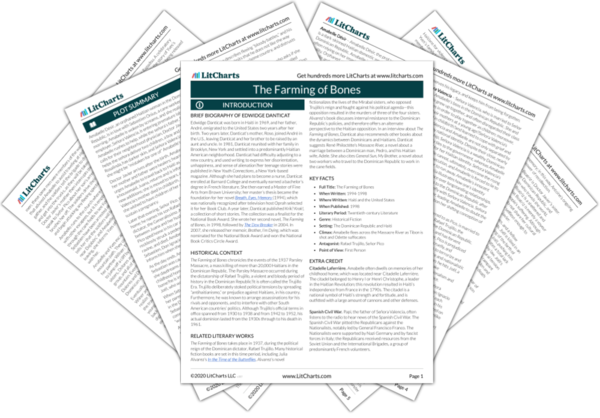The Massacre River, named for a slaughter of French buccaneers in 1728, took on additional historical significance during the Parsley Massacre; many bodies were left in the river after the violence. For Amabelle, however, the river is also personally significant. It is the site of her parents’ deaths, and the crossing she must make to return to Haiti in order to escape the massacre. Furthermore, when Amabelle first arrives in the Dominican Republic, her future employers find her alongside the river; in this way, the river is her constant companion, and signals the transitions that she endures throughout her life.
Additionally, Amabelle often dreams about the river and her parents’ demise; in this way, the river is a representation of death, an omnipresent and powerful force in her life. Throughout the story, the river brings grief to Amabelle and her acquaintances; when they attempt to ford the river and return to Haiti, some of their compatriots die in the crossing, and the survivors are left to mourn their loss. When Amabelle attempts to rebuild her life in Haiti, she is at first unable to confront the sight of the rivera physical representation of her griefor offer a testimony of the atrocities she has seen. Eventually, however, Amabelle begins to live in spite of her sadness, and attempts a form of reconciliation with the river. She returns to the riverside and floats in it, in an effort to find relief from her past and offer a tribute to the violence she has witnessed and endured.
The Massacre River Quotes in The Farming of Bones
The water rises above my father’s head. My mother releases his neck, the current carrying her beyond his reach. Separated, they are less of an obstacle for the cresting river. I scream until I can taste blood in my throat, until I can no longer hear my own voice […] I walk down to the sands to throw [myself] into the water […]
Two of the river boys grab me and […] pin me down to the ground until I become still. “Unless you want to die,” one of them says, “you will never see those people again.”
“Give yourself a pleasant dream. Remember not only the end, but the middle, and the beginning, the things they did when they were breathing. Let us say that the river was still that day.”
“And my parents?”
“They died natural deaths many years later.”
“And why did I come here?”
“Even though you were a girl when you left and I was already a man when I arrived and our families did not know each other, you came here to meet me.”
I thought that if I relived the moment often enough, the answer would become clear, that they had wanted either for us all to die together or for me to go on living, even if by myself. I also thought that if I came to the river on the right day, at the right hour, the surface of the water might provide the answer: a clearer sense of the moment, a stronger memory. But nature has no memory. And soon, perhaps, neither will I.
I slipped into the current […]with my shoulders only half submerged, the current floating over me in a less than gentle caress, the pebbles in the riverbed scouring my back.
I looked to my dreams for softness, for a gentler embrace, for relief from the fear of mudslides and blood bubbling out of the riverbed, where it is said the dead add their tears to the river flow.












